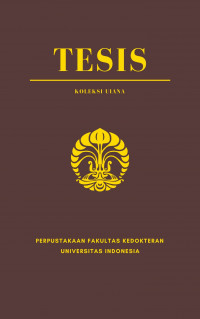Tesis
Hubungan Kebutuhan Lansia Gangguan Jiwa di Panti Sosial Tresna Werdha (PSTW) dengan Kualitas Hidup dan Adaptasi Instrumen Camberwell Assessment of Need for the Elderly (CANE) = Correlation between the Needs of the Elderly with Mental Disorders and the Quality of Life at the Tresna Werdha Residential Home and the Adaptation of the Camberwell Assessment of Need for the Elderly (CANE).
Latar Belakang: Jumlah orang berusia 60 tahun atau lebih sebanyak 962 juta orang, setara dengan 13% populasi dunia dan sekitar 15% dari jumlah tersebut menderita gangguan jiwa. Pada tahun 2050, Indonesia diproyeksikan akan memiliki 72 juta orang berusia diatas 60 tahun. Salah satu cara pemerintah dalam memenuhi kebutuhan adalah dengan mengadakan kegiatan Panti Sosial Tresna Werdha (PSTW) yang dikhususkan untuk lansia. Dibutuhkan adanya penelitian mengenai apakah kebutuhan lansia gangguan jiwa yang berada di PSTW sudah terpenuhi dan bagaimanakah hubungannya dengan kualitas hidup mereka. Dengan banyaknya kebutuhan yang tersebar dalam berbagai area, maka akan dilakukan adaptasi instrumen Camberwell Assessment of Need for the Elderly (CANE) terlebih dahulu. Metode: Sebanyak 104 dataset didapatkan dari lansia gangguan jiwa, pengasuh dan staf yang merawat. Pengambilan sampel ditetapkan secara consecutive sampling. Uji yang dilakukan yaitu uji kesahihan isi, uji keandalan konsistensi internal dan uji keandalan interrater. Instrumen yang sahih dan andal digunakan untuk mengukur kebutuhan 50 lansia gangguan jiwa di PSTW dan dihubungkan dengan kualitas hidup dengan menggunakan metode analitik kuantitatif potong lintang. Pengambilan sampel ditetapkan secara consecutive sampling. Pengukuran kualitas hidup menggunakan WHOQoL-BREF Bahasa Indonesia. Hasil: Content validity index for scales (S-CVI) sebesar 1,0. Uji keandalan konsistensi internal koefisien Cronbach's Alpha memperoleh hasil 0,86. Uji keandalan interrater menghasilkan nilai koefisien kappa sebesar 0,98 (p < 0,001). Terdapat hubungan antara kebutuhan perawatan diri dengan kualitas kesehatan fisik, terdapat hubungan antara kebutuhan merawat rumah/perawatan diri/daya ingat/ distres psikologis/uang atau anggaran dengan kualitas psikologis, terdapat hubungan antara kebutuhan makanan/perawatan diri dengan kualitas hubungan sosial dan terdapat hubungan antara kebutuhan terkait gejala psikotik/informasi/uang atau anggaran dengan kualitas lingkungan (p ≤ 0,05). Terdapat hubungan yang bermakna secara statistik antara jumlah kebutuhan dengan kualitas hidup domain psikologis (p ≤ 0,05). Kesimpulan: CANE bahasa Indonesia adalah instrumen yang sahih dan andal. Terdapat hubungan antara kebutuhan lansia dengan gangguan jiwa dengan kualitas hidup sehingga dibutuhkan evaluasi kebutuhan secara rutin di PSTW.
Kata Kunci: Camberwell Assessment of Need for the Elderly (CANE), kebutuhan lansia gangguan jiwa, kualitas hidup, Panti Sosial Tresna Werdha (PSTW).
Background: The number of people aged 60 years or more is 962 million people, equivalent to 13% of the world's population and around 15% of that number suffer from mental disorders. Indonesia will have 72 million people aged over 60 years by 2050. Government fulfills elderly needs (including mentally disorder elderly) by holding the Tresna Werdha Residential Home. Research to evaluate the mentally disorder elderly's needs and how it relates to their quality of life is needed. Methods: Firstly, an adaptation of the Camberwell Assessment of Need for the Elderly (CANE) conducted using consecutive sampling. Interviews resulted in 104 datasets obtained from elderly with mental disorders, carers, and staff. The validity used a content validity test. The reliability process used an internal consistency reliability test and an interrater reliability test. The needs of 50 mentally disorder elderly in Tresna Werdha Residential Home were evaluated by the valid and reliable CANE. Correlation between the mentally disorder elderly's needs and quality of life analyzed using the cross-sectional quantitative analytical method. Quality of life's measurements used the Indonesian WHOQoL-BREF. Result: Content validity index for scales (S-CVI) is 1.0. The internal consistency of the Cronbach's Alpha coefficient is 0.86. The interrater reliability test resulted in a kappa coefficient of 0.98 (p < 0.001). This research also found there is a correlation between self-care and the physical health-domain (p ≤ 0.05). Looking after the home/selfcare/memory/psychological distress/money correlating to the psychological-domain (p ≤ 0.05). Food/self-care correlating to the social relationships-domain (p ≤ 0.05). The needs related to psychotic symptoms/information/money or budgeting correlating to the environmental-domain (p ≤ 0.05). There is a statistically significant correlation between the number of needs and the quality of life in the psychological-domain (p ≤ 0.05). Conclusion: Indonesian CANE is a valid and reliable instrument. There is a correlation between the mentally disorder elderly's needs and the quality of life. Therefore a routine needs evaluation is needed at Tresna Werdha Residential Home.
Keywords: Camberwell Assessment of Need for the Elderly (CANE), the needs of the elderly with mental disorders, Tresna Werdha Residential Home, quality of life.
- Judul Seri
-
-
- Tahun Terbit
-
2021
- Pengarang
-
Arundhati Nugrahaning Aji - Nama Orang
Martina Wiwie Nasrun - Nama Orang - No. Panggil
-
T21048fk
- Penerbit
- Jakarta : Sp-2 Ilmu Kesehatan Jiwa., 2021
- Deskripsi Fisik
-
xvi, 150 hlm. ; 21 x 30 cm
- Bahasa
-
Indonesia
- ISBN/ISSN
-
-
- Klasifikasi
-
NONE
- Edisi
-
-
- Subjek
- Info Detail Spesifik
-
Tanpa Hardcopy
| T21048fk | T21048fk | Perpustakaan FKUI | Tersedia |


Masuk ke area anggota untuk memberikan review tentang koleksi